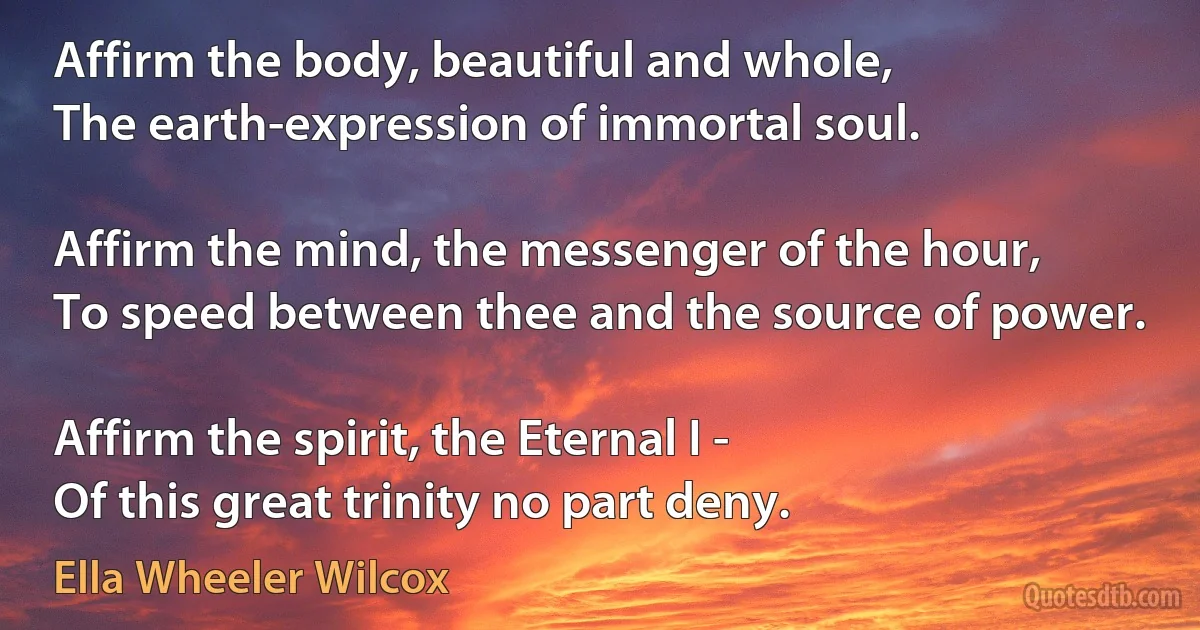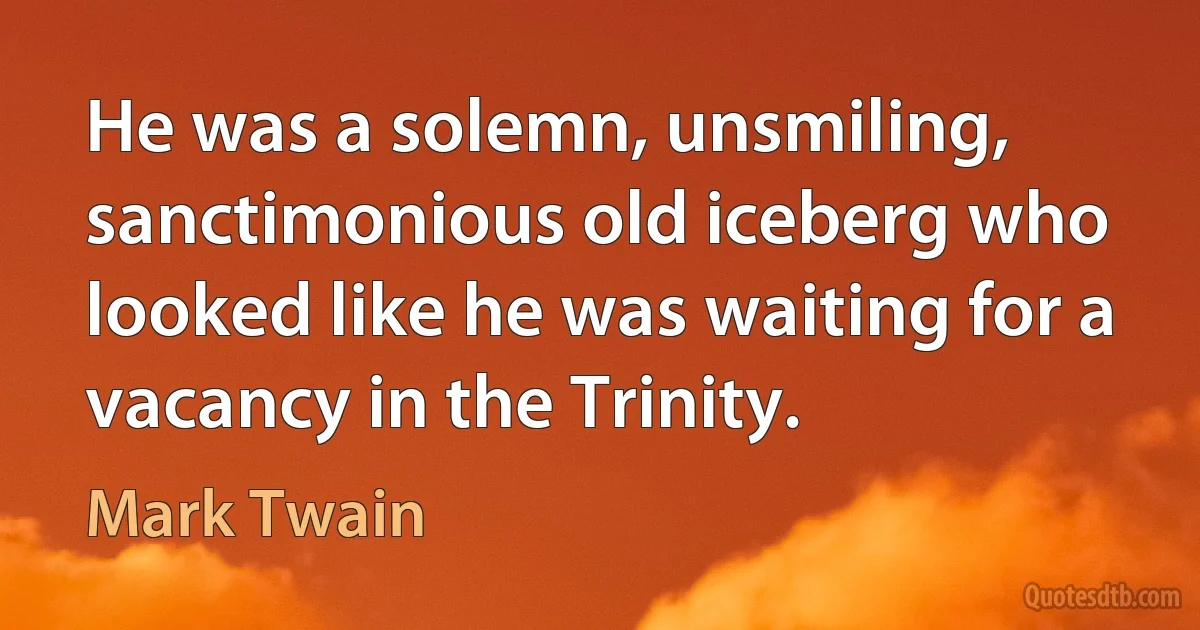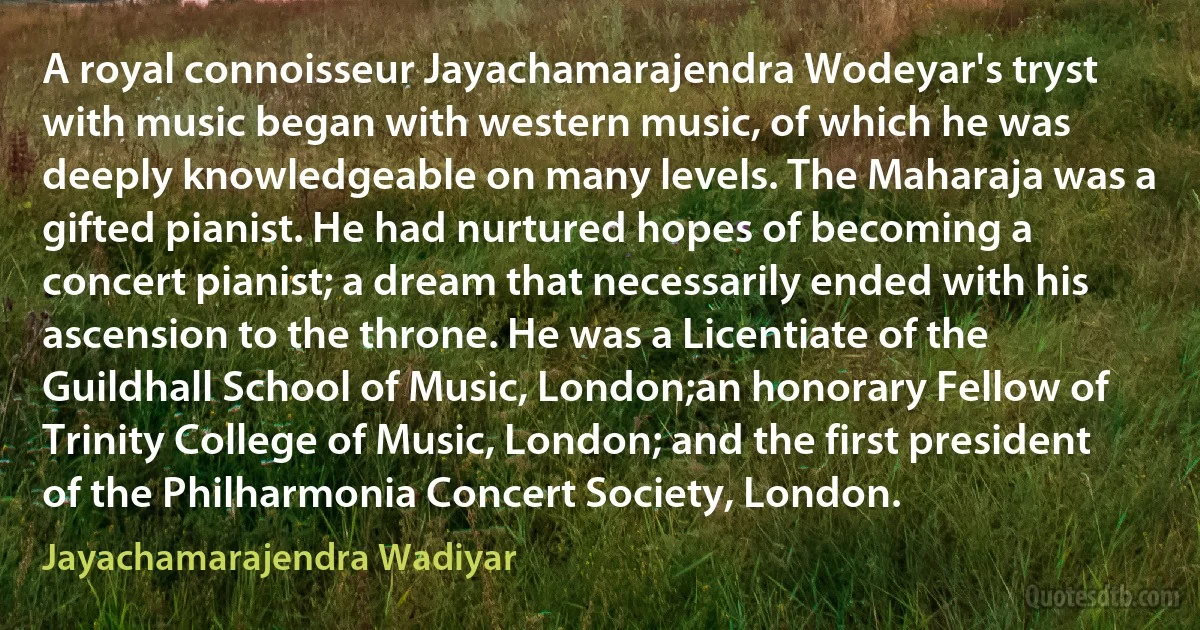Trinity Quotes - page 5
It is not only the soul that is sanctified and communicates with God, but also the human body through the communion of the Body and Blood of Christ becomes united with the entire Holy Trinity. By the grace of God and with the participation of his own will and effort, man becomes a new creature, a partaker in the eternal Kingdom of God.

John of Shanghai and San Francisco
As the Holy Trinity, our God is One Being, although Three Persons, so, likewise, we ourselves must be one. As our God is indivisible, we also must be indivisible, as though we were one man, one mind, one will, one heart, one goodness, without the smallest admixture of malice - in a word, one pure love, as God is Love. That they may be one, even as We are One (John 17:22).

John of Kronstadt
Now there have been delivered to us in the Gospel three Persons and names through whom the generation or birth of believers takes place, and he who is begotten by this Trinity is equally begotten of the Father, and of the Son, and of the Holy Ghost -for thus does the Gospel speak of the Spirit, that "that which is born of Spirit is spirit,” and it is "in Christ "that Paul begets, and the Father is the "Father of all”.

Gregory of Nyssa
Instead of understanding and following the teachings of Jesus, the Christians argued and quarreled about the nature of Jesus's divinity and about the Trinity. They called each other heretics and persecuted each other and cut each other's heads off. There was a great and violent controversy at one time among different Christian sects over a certain diphthong. One party said that the word Homo-ousion should be used in a prayer; the other wanted Homoi-ousion-this difference had reference to the divinity of Jesus. Over this diphthong fierce war was raged and large numbers of people were slaughtered.

Jawaharlal Nehru
Califano and I both went to the Holy Trinity Church here when our children were small, and part of the service was that, after 9:00 or 10:00 mass, the children would go down for Sunday school, and they would have a discussion there for the grownups. They'd have one of the Jesuits who would come over and lead the discussion, and they were always enormously interesting, very interesting, very gifted, talented lecturers. There were always a couple hundred people who were there with their children, and then, at whatever time, an hour later, you would break up and hook up with your children and drive them home.

Ted Kennedy
For the very Church itself is, properly and principally, the Spirit Himself, in whom is the Trinity of the One Divinity-Father, Son, and Holy Spirit. (The Spirit) combines that Church which the Lord has made to consist in "three.” And thus, from that time forward, every number (of persons) who may have combined together into this faith is accounted "a Church,” from the Author and Consecrator (of the Church). And accordingly "the Church,” it is true, will forgive sins: but (it will be) the Church of the Spirit, by means of a spiritual man; not the Church which consists of a number of bishops. For the right and arbitrament is the Lord's, not the servant's; God's Himself, not the priest's.

Tertullian
From the Colchester Grammar-School, when eighteen years of age, he went, in 1819, to Trinity College, Cambridge. Three years afterward he was elected to a scholarship. In 1823, on his graduating B. A., young Airy came out as Senior Wrangler. In 1824 he obtained his fellowship at Trinity. His degree of M. A. was taken in 1826, and he was simultaneously elected, though only then in his twenty-fifth year, as Lucasian Professor at Cambridge. Illustrious philosophers like Barrow and Newton had preceeded him... Latterly, however, the office had become, in a great measure, purely honorary, and might also be said to have degenerated into a sinecure.

George Biddell Airy
Our Substance is our Father, God Almighty, and our Substance is our Mother, God, All-wisdom; and our Substance is in our Lord the Holy Ghost, God All-goodness. For our Substance is whole in each Person of the Trinity, which is one God. And our Sense-soul is only in the Second Person Christ Jesus; in whom is the Father and the Holy Ghost: and in Him and by Him we are mightily taken out of Hell, and out of the wretchedness in Earth worshipfully brought up into Heaven and blissfully oned to our Substance: increased in riches and in nobleness by all the virtues of Christ, and by the grace and working of the Holy Ghost.

Julian of Norwich



